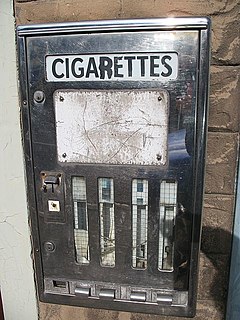Facts
The Parrot Corporation was a company which manufactured and exported floppy disks. [5] The company was a start-up venture funded by the Welsh Development Agency (WDA). [6] As part of the financing provided to the company by the WDA, the WDA took security by means of an all-assets floating charge over the company's assets and undertaking.
The company then sought to raise further finance from the Export Finance Co Ltd (Exfinco). That financing was documented principally under a master agreement which Staughton LJ referred to in the judgment as "a document of remarkable complexity". [7] Under that agreement, broadly, every time the company agreed an overseas sale, it triggered a mandatory offer from Exfinco to buy the goods from the company, and then promptly resell the goods to the overseas purchaser. In relation to the resale the company would act as agent for Exfinco and Exfinco would be the undisclosed principal. Accordingly, the only person whom the overseas buyers ever dealt with was the company - they were unaware of the role played by Exfinco in each and every sale. The company would then also receive the purchase price from the overseas buyer as agent for Exfinco, and those sums would be paid into a segregated account which was completely under the control of Exfinco. The goods sold overseas would be subject to a title retention clause in favour of Exfinco.
The Parrot Corporation began to encounter severe financial difficulties, partly because of the collapse in the price of floppy disks, but also allegations of financial irregularities swirled around the company. [8] On 16 May 1989 the company ceased trading, and a dispute arose between WDA and Exfinco as to whether the arrangements under the master agreement were effective, and accordingly who had the better claim to moneys paid (and still payable) by overseas buyers to the company.

Macmillan Inc v Bishopsgate Investment Trust plc [1995] EWCA Civ 55, [1996] WLR 387 is a judicial decision relating to English trusts law and conflict of laws case from the Court of Appeal. The issue arose in relation to frauds conducted by the late Robert Maxwell.

In finance, a security interest is a legal right granted by a debtor to a creditor over the debtor's property which enables the creditor to have recourse to the property if the debtor defaults in making payment or otherwise performing the secured obligations. One of the most common examples of a security interest is a mortgage: a person borrows money from the bank to buy a house, and they grant a mortgage over the house so that if they default in repaying the loan, the bank can sell the house and apply the proceeds to the outstanding loan.

L'Estrange v F Graucob Ltd [1934] 2 KB 394 is a leading English contract law case on the incorporation of terms into a contract by signature. There are exceptions to the rule that a person is bound by his or her signature, including fraud, misrepresentation and non est factum.

Hunter v Moss [1994] 1 WLR 452 is an English trusts law case from the Court of Appeal concerning the certainty of subject matter necessary to form a trust. Moss promised Hunter 50 shares in his company as part of an employment contract, but failed to provide them. Hunter brought a claim against Moss for them, arguing that Moss's promise had created a trust over those 50 shares. The constitution of trusts normally requires that trust property be segregated from non-trust property for the trust to be valid, as in Re London Wine Co (Shippers) Ltd. On this occasion, however, both Colin Rimer in the High Court of Justice and Dillon, Mann and Hirst LJJ in the Court of Appeal felt that, because this case dealt with intangible rather than tangible property, this rule did not have to be applied. Because all the shares were identical, it did not matter that they were not segregated, and the trust was valid. The decision was applied in Re Harvard Securities, creating a rule that segregation is not always necessary when the trust concerns intangible, identical property.

Progress Property Co Ltd v Moorgarth Group Ltd[2010] UKSC 55 is a UK company law case concerning the circumstances by which a transaction at an undervalue would be considered an unauthorised return of capital.

Agnew v Commissioners of Inland Revenue, more commonly referred to as Re Brumark Investments Ltd[2001] UKPC 28 is a decision of the Privy Council relating to New Zealand and UK insolvency law, concerning the taking of a security interest over a company's assets, the proper characterisation of a floating charge, and the priority of creditors in a company winding-up.
Shamji v Johnson Matthey Bankers Ltd [1991] BCLC 36 is a UK insolvency law case concerning the administration procedure when a company is unable to repay its debts.

Medforth v Blake[1999] EWCA Civ 1482 is a UK insolvency law case concerning the duties of a receiver and manager in the United Kingdom, over and above a duty of good faith, as to the manner in which he conducts a business.

Downsview Nominees Ltd v First City Corp Ltd [1992] UKPC 34 is a New Zealand insolvency law case decided by the Judicial Committee of the Privy Council concerning the nature and extent of the liability of a mortgagee, or a receiver and manager, to a mortgagor or a subsequent debenture holder for his actions.

Sinclair Investments (UK) Ltd v Versailles Trade Finance Ltd[2011] EWCA Civ 347 is an English trusts law case, concerning constructive trusts. Sinclair was partially overruled in July 2014 by the UK Supreme Court in FHR European Ventures LLP v Cedar Capital Partners LLC.

Silven Properties Ltd v Royal Bank of Scotland[2003] EWCA Civ 1409 is an English land law case, concerning the behaviour of receivers appointed under mortgages. It affirmed the proposition that a lender are not required to incur expenses that would likely delay a sale beyond the normal period of marketing.

Cuckmere Brick Co v Mutual Finance[1971] EWCA Civ 9 is an English tort law case, establishing the lender must publish/promote the materially beneficial key, intrinsic facts as to land in mortgage repossession sales. As it affects the duty of mortgagees, to that extent it can be considered within the periphery of English land law also.
Mortgages in English law are a method of raising capital through a loan contract. Typically with a bank, the lender/mortgagee gives money to the borrower/mortgagor, who uses their property/land/home as security that they will repay the debt and any relevant interest. If the mortgagor fails to repay, then the mortgaged property which has been used as security may be subject to various mortgagee remedies allowing them to retrieve the debt. Mortgages are an important part of English land law and property law. These concern, first, the common law, statutory and regulatory rules to protect the mortgagor at the time of concluding the mortgage agreement. Second, English law defines and restricts the process for taking possession of property in the event of default. Third, it places duties on mortgagees on the price it achieves when selling property.

Re Goldcorp Exchange Ltd [1994] UKPC 3 is an English trusts law case by the Judicial Committee of the Privy Council decision on appeal from the Court of Appeal of New Zealand. It considers when there is sufficient certainty of subject matter to form a trust, and tracing. A company dealing in gold and other precious metals became insolvent and the Bank of New Zealand appointed receivers under a debenture. They in turn asked the High Court for guidance on how to treat the company's customers, and Thorp J refused the claims of most of the customers, leaving three categories to be settled on appeal. The outstanding issue was whether the customers had title to the gold on for them, and thus beneficiaries of a trust, or were merely unsecured creditors resulting from a breach of contract.

Multinational Gas and Petrochemical Co v Multinational Gas and Petrochemical Services Ltd [1983] Ch 258 is a leading United Kingdom company law case relating to directors' liability. The case is the principal authority for the proposition that a company will not be able to make any claim against a director for breach of duty where the acts of the director have been ratified by the members of the company.

VTB Capital plc v Nutritek International Corp[2013] UKSC 5, [2013] 2 AC 337 is an English company law case, concerning piercing the corporate veil for fraud.

Ayerst v C&K (Construction) Ltd [1976] AC 167 was a decision of the House of Lords relating to revenue law and insolvency law which confirmed that where a company goes into insolvent liquidation it ceases to be the beneficial owner of its assets, and the liquidator holds those assets on a special "statutory trust" for the company's creditors.

Royal Trust Bank v National Westminster Bank plc [1996] BCC 613 was a decision of the Court of Appeal in relation to the nature of a floating charge.

Re Curtain Dream plc [1990] BCLC 925 is a judicial decision of the English courts in relation to recharacterisation. It held that where a transaction was documented in a certain way to mask the true nature of the transaction, the court could disregard the mask and construe the transaction as it was intended to be in truth. The court held that properly construed the transaction in question was a mortgage which was void against a liquidator for non-registration.

Borden (UK) Ltd v Scottish Timber Products Ltd [1981] Ch 25 is a judicial decision of the Court of Appeal of England and Wales relating to retention of title clauses, and the extent to which the vendor of raw material can seek to assert title to good into which those raw materials are subsequently worked. The court held that when the relevant raw material was worked into another product it ceased to exist as a separate type of property, and accordingly it was no longer possible for a seller to retain title to it.













